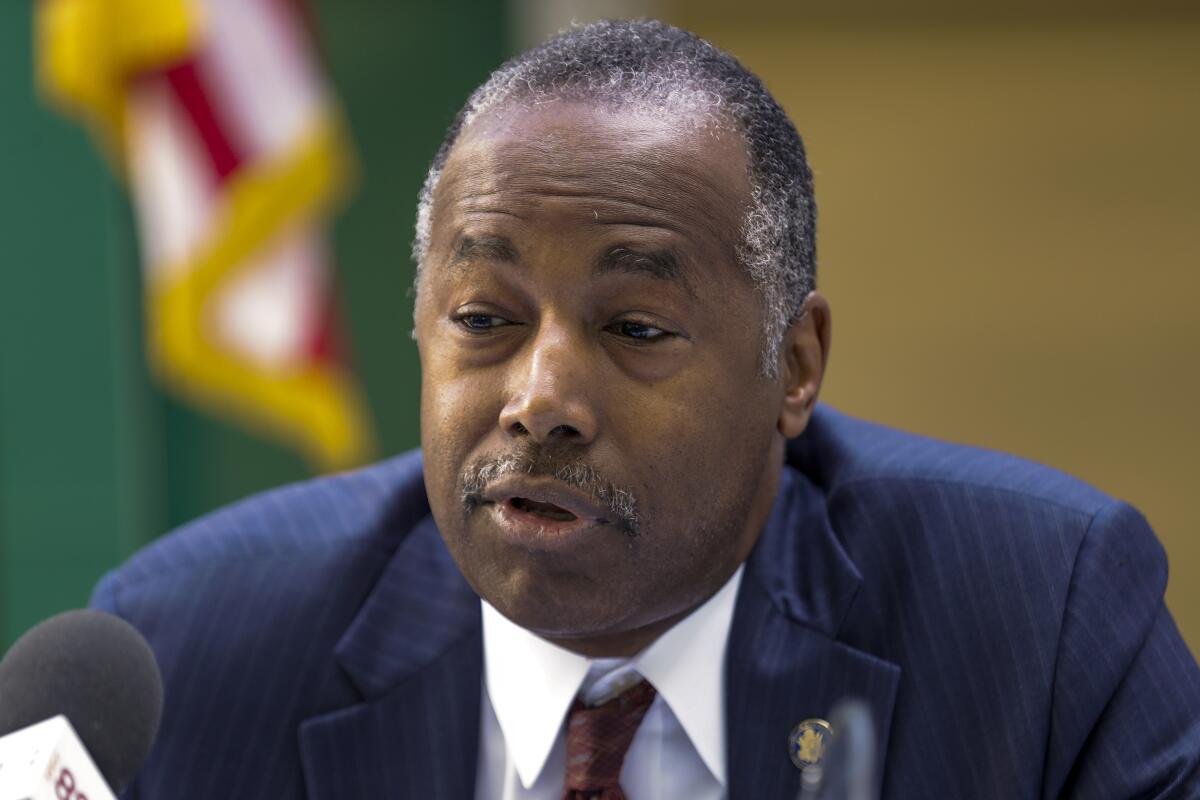Federal aid for L.A. homelessness hasn’t materialized. If it does, don’t expect ‘the cavalry’

- Share via
WASHINGTON — L.A. Mayor Eric Garcetti met with Housing and Urban Development Secretary Ben Carson on Friday, ending with encouraging words, but no deal to help the city’s massive homeless population.
The lack of an announcement comes after months of negotiations and increasingly conciliatory language between the two political camps.
Garcetti, who was in Washington to attend the U.S. Conference of Mayors’ annual meeting, had built up anticipation for an announcement while speaking with reporters on Thursday, saying he hoped to reach an agreement in principle, even if it would take time to fill in the details.
The mayor has spoken with Carson several times. His aides spent the week in Washington, hammering out potential agreements to use federal land and money to build temporary shelters.
Homelessness has reached a crisis point in Los Angeles, and Garcetti, though a partisan Democrat, is under pressure to reach a deal with the Trump administration, given the scope of the need for shelter beds and affordable housing. Trump, who has used the crisis in America’s cities to beat up on Democratic mayors, also is eager to cut a deal that would show him fixing a problem that he has characterized as urban blight.
Both sides say that a deal remains within reach. But Garcetti downplayed expectations that it would be big, warning on Thursday that residents should not expect the federal government to send in “the cavalry.” The talks have centered on how to use federal land and other resources, such as health services, to help move and keep homeless people off the streets.
Neither side was willing to divulge how financially large the federal support might be.
The talks come as L.A. has devoted an increasing amount of money toward building more shelters and housing and creating supportive services for homeless people. But in the eyes of the federal government and many Angelenos, these efforts are not happening fast enough.
The first homeless housing project funded by Proposition HHH, the $1.2-billion bond, which passed in 2016, had its grand opening earlier this month. An additional 20 projects are under construction, and work will begin on 30 more later this year.
“We have agreed on the need for temporary emergency housing so vulnerable individuals can go to bed with a roof over their heads,” Carson said in a written statement after the meeting. “It is a logical thing to offer people a safe environment while the safer environment is being completed. ...There is no reason, in good conscience, to leave people and families languishing for years until a solution is struck, state funds flow, and more permanent or transitional housing is completed.”
In September, federal officials, including Carson, visited Los Angeles to study the homelessness crisis, in which nearly 59,000 people are living countywide in street encampments, vehicles and shelters, according to data collected last year. In the city of Los Angeles, there are 36,000 homeless people.
The city is currently adding to its own network of temporary shelters. So far, at least nine shelters have opened with a combined 519 beds. In all, another 2,300 new beds are some stage of being built.
Garcetti’s office would not make him available for interview on Friday.
In a statement, he thanked Carson and promised to work with the federal government to secure “new resources to Los Angeles to house more of our homeless neighbors through the use of federal lands, new funds, and the wraparound support services they need to permanently come off the streets.”
“We have an opportunity to show our fellow Californians — and the country — how we will rise to the challenge by working across party lines to put people first and compassionately house our most vulnerable,” he added.
More to Read
Sign up for Essential California
The most important California stories and recommendations in your inbox every morning.
You may occasionally receive promotional content from the Los Angeles Times.












